Ayman al-Zawahiri, current leader of the al-Qaeda international terrorist organization, appeared on Saturday in a video marking the 20th anniversary of the 9/11 attacks.
Zawahiri’s health is regarded as poor by counter-terrorism experts, and there have been several rumors of his death, most recently in December 2020. At that time, several terrorism experts concluded that since nothing had been heard from the al-Qaeda leader for almost a year, he was probably either dead, crippled by illness, or so deep in hiding that he no longer played a significant operational role in the terrorist organization.
Some analysts praised Zawahiri for his cunning in keeping a low profile for both himself and his organization while al-Qaeda’s more fanatical and feral offshoot, the Islamic State, grabbed all the headlines and drew all the international military attention. Others derided Zawahiri’s lack of charisma and low operational tempo, pointing to the long absence of major terrorist actions by al-Qaeda as a sign the once-feared group was declining as a global threat under his leadership.
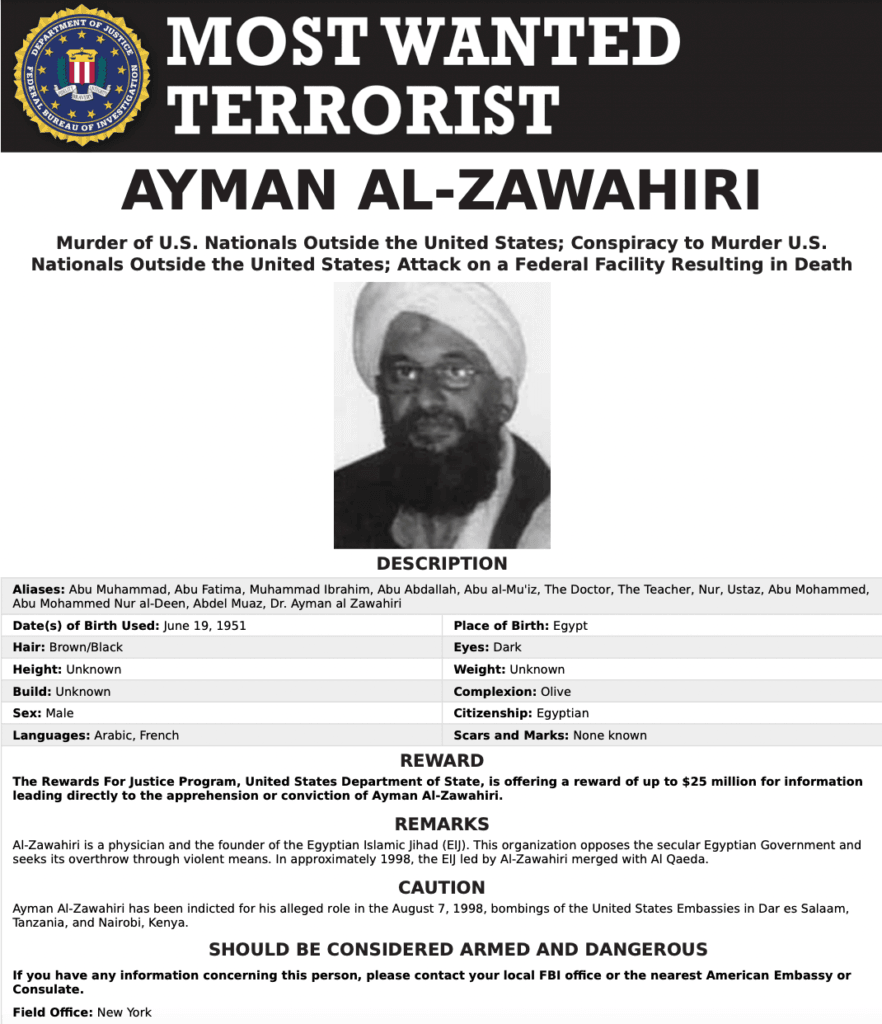
FBI Most Wanted Terrorists
Zawahiri, born in 1959 in Egypt, joined forces with Osama bin Laden in the late 1980s and co-founded al-Qaeda as its behind-the-scenes logistical expert. He became the nominal leader of al-Qaeda after bin Laden was killed by U.S. special forces operators in Pakistan in 2011.
The video message from Zawahiri circulated on Saturday by al-Qaeda social media channels may have been intended as a proof-of-life message, although analysts like Rita Katz of the SITE Intelligence Group noted the video does not include any direct reference to the Taliban takeover of Afghanistan.
Katz reported the most recent event Zawahiri clearly described in his hour-long video message was the attack on a Russian military base by al-Qaeda-linked forces on January 1, 2021. He also mentions the United States “making its exit from Afghanistan,” but that might have been a reference to the U.S. withdrawal negotiations with the Taliban that began in February 2020. The video was entitled “Jerusalem Will Not Be Judaized,” and as the title suggests, it dwelled at much greater length on Jerusalem than the Taliban’s victory in Afghanistan.
This means the video was likely recorded after rumors of Zawahiri’s death circulated last December, but not necessarily within the past few months. Katz cited Islamic State supporters on social media dismissing the video as inconclusive and challenging their rivals in al-Qaeda to provide more solid evidence that Zawahiri is alive.
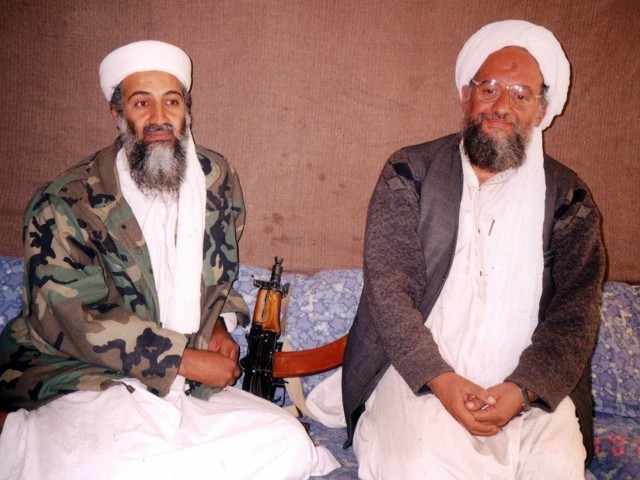
Osama bin Laden (L) sits with his adviser Ayman al-Zawahiri, an Egyptian linked to the al Qaeda network, during an interview with Pakistani journalist Hamid Mir (not pictured) at an undisclosed location in Afghanistan. In the article, which was published November 10, 2001 in Karachi, bin Laden said he had nuclear and chemical weapons and might use them in response to U.S. attacks. (Photo by Visual News/Getty Images)
The video was created by al-Qaeda’s media and propaganda operation, As Sahab, which the Long War Journal noted has been fairly quiet during 2021.
The video release was accompanied by the publication of a hefty 852-page book ostensibly written by Zawahiri, with an introduction dated April 2021. The video, book, and all associated publicity materials include “May Allah protect him” after each mention of Zawahiri’s name, a phrase that would customarily imply he is alive.
In one section of the video, Zawahiri praises “martyrs” who died for the Islamist cause over the past two years, including Mohammed Saeed al-Shamrani, the Saudi military officer who perpetrated the terrorist attack on Naval Air Station Pensacola in December 2019. His reference to the January 2021 attack on the Russia military base in Syria came in the context of praising the al-Qaeda “martyrs” who have died in Syria.
Zawahiri called on al-Qaeda supporters, and Muslims in general, to carry out attacks against American targets around the world to force the United States into retreat. He suggested those squeamish about murdering civilians, as al-Qaeda did on 9/11, can find no shortage of U.S. military personnel and installations to attack.
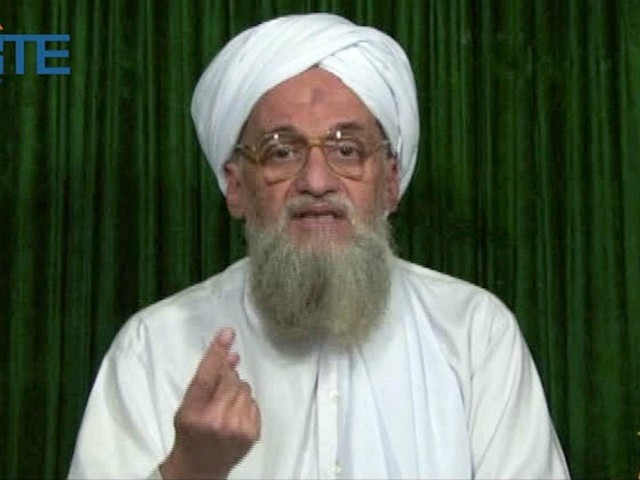
This handout picture of a video grab provided by the SITE Intelligence Group on February 12, 2012, shows Al-Qaeda’s chief Ayman al-Zawahiri at an undisclosed location making an announcement in a video-relayed audio message posted on jihadist forums. (AFP Photo/SITE Intelligence Group)
“Those who retreat in the face of its power, America does not spare them until it has completely overcome them,” he said.
“If you want jihad to be focused solely on military targets, the American military has presence all over the world,” he advised.
Zawahiri’s mentions of both Afghanistan and 9/11 were brief. He praised the “nineteen mujahedeen, the warriors of Islam,” who “stabbed America in its heart” on September 11, 2001. He said this was an “injury the like of which America had never tasted before,” and said the United States is now “making its exit from Afghanistan broken, defeated, after 20 years of war.”
Zawahiri praised the Taliban at length, but did not mention them taking control of Afghanistan or capturing Kabul, and none of the pictures or quotes from Taliban leaders employed in the video were recent.
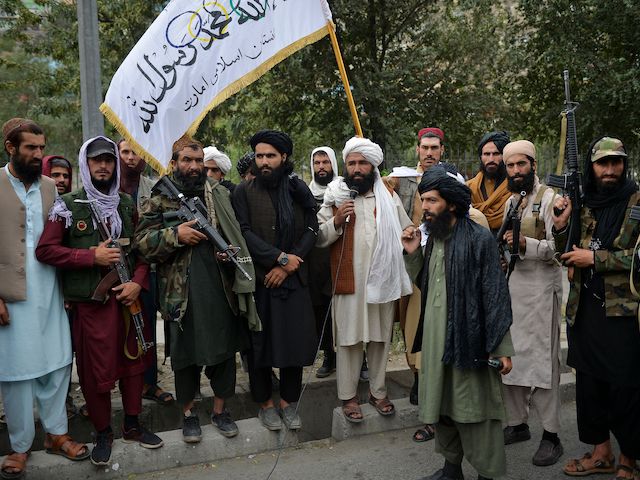
Taliban fighters gather along a street during a rally in Kabul on August 31, 2021, as they celebrate after the US pulled all its troops out of the country to end a brutal 20-year war — one that started and ended with the hardline Islamist in power. (Hoshang Hashimi/AFP via Getty Images)
The Long War Journal pointed to one interesting line from Zawahiri that suggests his dialogue for the video was not recorded recently — he touted the cause of jihad in China’s Xinjiang province, home of the oppressed Uyghur Muslims. Al-Qaeda’s close allies in the Taliban have been going to great lengths recently to assure China they will not harbor jihadis from Xinjiang or allow terrorist attacks to be launched against Chinese interests from Afghanistan. If Zawahiri’s dialogue was recorded recently, the Taliban would probably have urged him not to encourage jihad in Xinjiang.
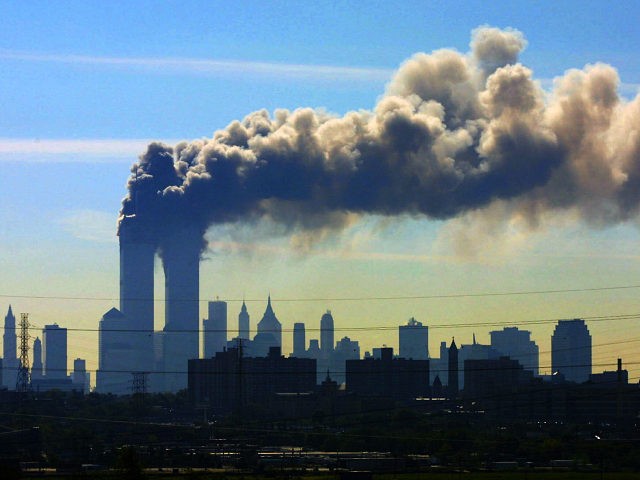
COMMENTS
Please let us know if you're having issues with commenting.